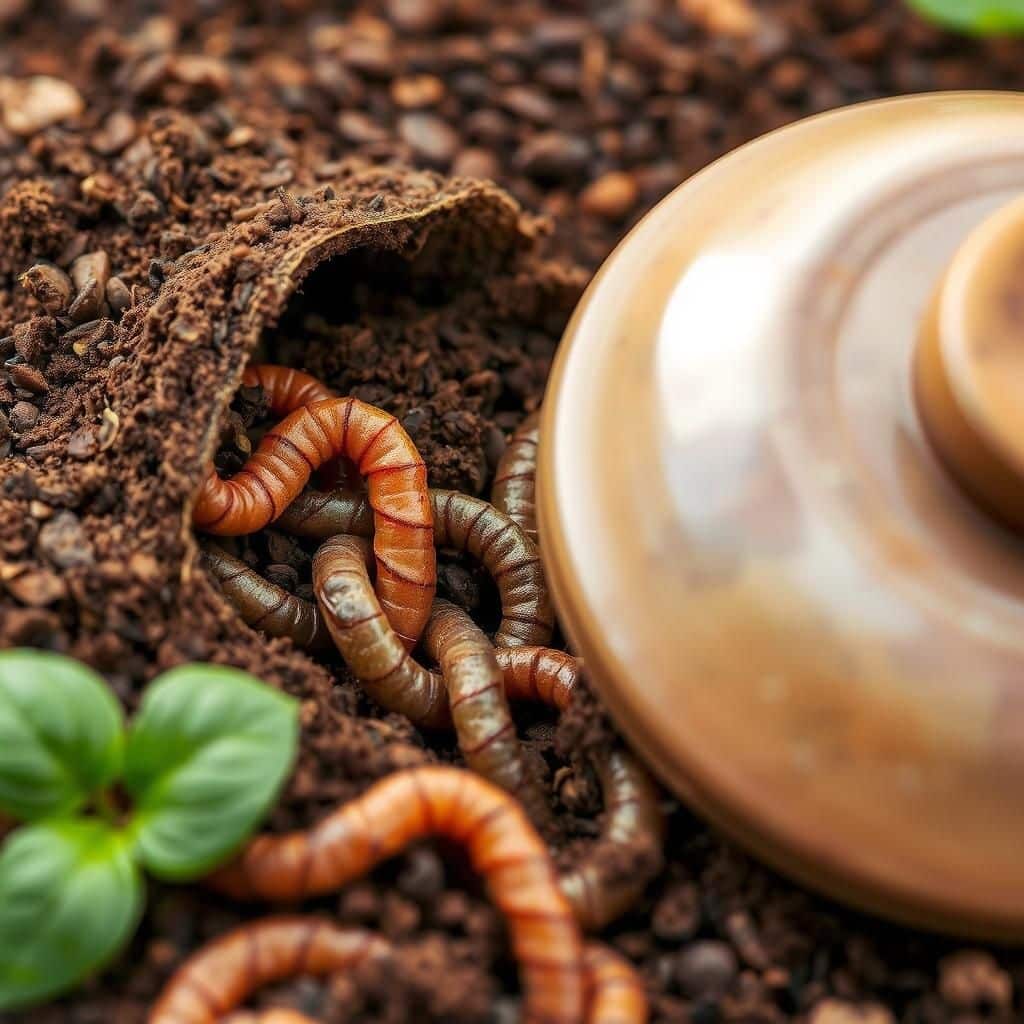Do Worms Like Coffee Grounds in the Compost? Discover the Benefits for Your Worm Bin

As more people embrace eco-friendly practices in gardening and composting, the question of what to feed composting worms becomes increasingly relevant. One popular topic among compost enthusiasts is whether worms enjoy coffee grounds. This article explores the benefits of incorporating coffee grounds into your worm bin, looking at their nutritional value, impact on worm health, and how they can enhance the composting process. Understanding these factors can help you create a thriving environment for your worms while producing rich, organic compost for your garden. Dive in to discover why coffee grounds might just be a perfect addition to your composting routine.
Do Worms Like Coffee Grounds in Compost?
Worms do indeed appreciate coffee grounds in their compost environment, as these remnants serve as a valuable source of nitrogen, which is essential for their growth and reproduction. The addition of coffee grounds can enhance the microbial activity in the compost pile, which in turn benefits the worms by providing them with a rich source of nourishment. Furthermore, coffee grounds help to improve the structure of the compost, allowing for better aeration and moisture retention, thus creating an ideal habitat for worms. However, it is important to balance coffee grounds with other compost materials to avoid creating a too acidic environment that could potentially harm the worms.
Benefits of Coffee Grounds for Worms
Adding coffee grounds to your compost provides several benefits for worms. The nitrogen content serves as a high-quality food source that promotes worm growth and activity, while the grounds also contain essential trace minerals that can enhance the overall health of the worm population. Additionally, the texture of coffee grounds can improve the aeration and moisture balance in the compost, creating an environment that is conducive to worm activity.
Coffee Grounds and Soil Health
When incorporated into compost, coffee grounds can also improve soil health. The organic matter contributes to the formation of humus, which is vital for soil structure and fertility. As worms break down the grounds, they help produce vermicompost, a nutrient-rich material that enhances soil quality and supports healthy plant growth. This process also aids in the retention of moisture in the soil, ensuring that plants have access to water even during dry spells.
How to Use Coffee Grounds in Compost
To use coffee grounds effectively in compost, it’s best to mix them with browns such as dried leaves or straw, as this creates a balanced carbon-to-nitrogen ratio. Aim to add approximately 25% coffee grounds to your compost mix and ensure that they are evenly distributed to avoid clumping, which can inhibit aeration. It's also advisable to monitor the pH levels, as overuse can lead to increased acidity, which might be detrimental to worm health.
See also:
Potential Drawbacks of Coffee Grounds
While coffee grounds offer many benefits, there are potential drawbacks as well. If used in excess, they can create an overly acidic environment within the compost, which could harm worms and other beneficial microbes. Additionally, some coffee grounds may contain pesticides or other chemicals, depending on the source of the coffee, potentially impacting the health of the compost ecosystem. Therefore, it is essential to ensure that the coffee grounds are organic and free from harmful residues.
Maintaining a Healthy Worm Population with Coffee Grounds
To maintain a healthy worm population while using coffee grounds, it’s crucial to practice moderation and ensure a balanced diet for the worms. Regularly monitor the compost for any signs of acidity or unpleasant odors, which could indicate an imbalance. Adding other compost materials rich in carbon, such as shredded paper or bark, can help maintain the proper pH levels and provide varied nutrition for the worms, promoting a thriving compost ecosystem.
| Aspect | Details |
|---|---|
| Nitrogen Source | Coffee grounds are high in nitrogen, essential for worms. |
| Soil Improvement | Enhances soil structure and fertility through organic matter. |
| Acidity Levels | May lower pH if overused; should be balanced with browns. |
| Microbial Activity | Supports beneficial microbes that help process compost. |
| Moderation is Key | Excessive coffee grounds can harm the worm population. |
Enhancing Vermicomposting with Coffee Grounds
Coffee grounds are a valuable addition to your worm bin, benefiting both the worms and your compost. These organic materials offer a rich source of nitrogen, which helps to create a balanced environment in the bin. Worms are naturally attracted to the strong aroma of coffee, finding it an enticing treat. Additionally, coffee grounds can help with aeration, preventing compacting in the compost and allowing for better oxygen flow. Incorporating coffee grounds not only feeds your worms but also aids in the breakdown of other organic materials, contributing to a healthier compost process.
What Nutritional Benefits Do Coffee Grounds Provide for Worms?
Coffee grounds are nutrient-dense, providing essential elements such as nitrogen, magnesium, and phosphorus. The high nitrogen content is particularly beneficial, as worms thrive on a diet rich in nitrogen to support their growth and reproduction. Moreover, these grounds can help create a more diverse microbial community, which is crucial for the overall health of the compost bin, as these microbes assist in breaking down organic matter.
How Do Coffee Grounds Affect the Worm Bin's pH Level?
Coffee grounds are typically slightly acidic, which can influence the pH levels in your worm bin. While worms prefer a neutral to slightly alkaline environment, the small amounts of coffee grounds, when added in moderation, can help to balance the overall microbial activity. This balance is essential, as it encourages the worms to thrive while supporting the various bacteria and fungi in the composting process without drastically altering the bin's pH.
See also:
Can Coffee Grounds Attract Pests in the Worm Bin?
Although coffee grounds can be beneficial, they may attract certain pests if used excessively. The aroma of coffee can lure in unwanted visitors, such as fruit flies or other insects. To minimize this risk, it’s crucial to ensure that coffee grounds are mixed well with other compost materials and used in moderation. A well-ventilated bin will also help deter pests, as a balanced and active compost system will discourage these nuisances.
How to Incorporate Coffee Grounds into Your Worm Bin?
To effectively incorporate coffee grounds into your worm bin, start by mixing them with other organic waste rather than adding them in large clumps. This helps to prevent any adverse effects on the compost's structure and ensures even distribution of nutrients. Aim to add one part coffee grounds for every three parts of other compost materials, and always ensure that the bin remains aerated and not too wet, as excess moisture can lead to problems such as odors or mold.
What Other Kitchen Scraps Complement the Benefits of Coffee Grounds?
In addition to coffee grounds, various kitchen scraps can further enhance your worm bin's effectiveness. Vegetable scraps, eggshells, and fruit peels are excellent companions to coffee grounds, as they provide different nutrients and maintain a balanced diet for the worms. Mixing these items not only aids in decomposition but also helps to create an inviting environment for the worms, ensuring their health and productivity in the composting process.
Questions from Our Readers
Do worms like coffee grounds in compost?
Yes, worms are generally attracted to coffee grounds when used in compost. They are a good source of nitrogen, which is beneficial for the composting process.
Can coffee grounds harm worms?
Not typically, but excessive amounts of coffee grounds can create an acidic environment that may be unfavorable for worms. It's best to use them in moderation to maintain a balanced compost ecosystem.
See also:
How should coffee grounds be added to compost for worms?
You should mix coffee grounds with other compost materials to ensure even distribution. This helps prevent clumping and maintains a suitable environment for the worms.
What other benefits do coffee grounds provide in compost?
In addition to attracting worms, coffee grounds enrich the compost with nutrients and improve soil structure. They can also help retain moisture and promote a healthy microbial population.

If you want to read more articles like Do Worms Like Coffee Grounds in the Compost? Discover the Benefits for Your Worm Bin, we recommend you check out our Compost category.
Leave a Reply
Related Articles